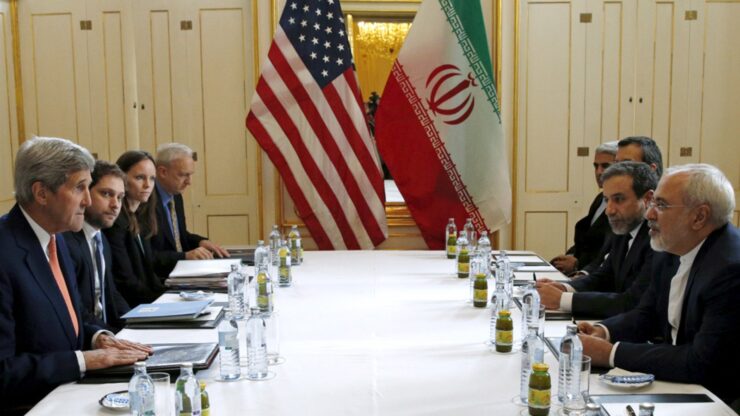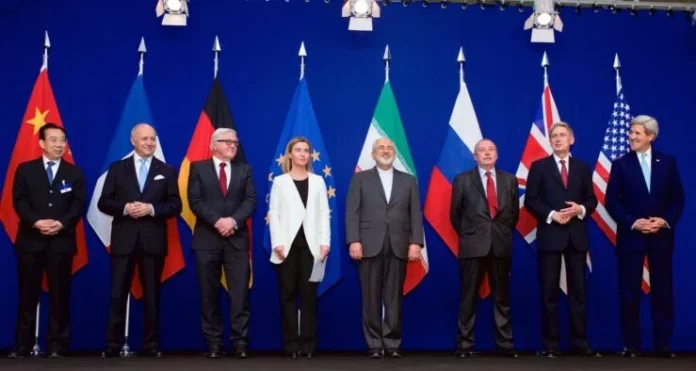The Joint Comprehensive Plan of Action (JCPOA) was considered a huge success for all the signatories. The nuclear deal was signed between Iran and “P5+1” nations, namely UK, France, Germany, Russia, China and the US, which joined in later. The deal was arrived at on July 14, 2015 after long-drawn out intense debates, peppered, at times, with ill-tempered discussions.
Yet it did create history as, after nearly 35 years, it had initiated direct diplomatic contact between US and Iran, a new era seemingly appeared on the horizon when Barack Obama offered to “extend a hand” if Iran “unclenched its fist”!
The JCPOA was adopted by all the six governments in October, 2015 and later endorsed by the UN Security Council (UNSC).
The nuclear deal was aimed to control Iran’s nuclear ambitions, under constant supervision of the International Atomic Energy Agency (IAEA), which released a report on January 16, 2016 confirming Iran honouring its commitments, thus signalling its implementation.
With the announcement came the expectation of Iran’s return to the international community and, notably for its government, the end of most EU sanctions and several important US sanctions.
With the legal structure already in place, the EU and US announced the formal repealing of their respective sanctions shortly after the release of the IAEA report. Additionally, the US President was required to certify to the legislature, every three months, that relief from sanctions to Iran, under the JCPOA, would not compromise US security interests.
Some sanctions, however, continued, and the announcement of fresh sanctions due to Iran’s repeated missile tests served as a blunt reminder that the two nations were still adversaries on many other issues.
As the readers would recollect, the year 2016 was also the election year in the US. All through his election campaigns, President Trump continued to call the deal as ‘the highest level of incompetence’, and promised to revoke it, if elected.
President Trump charged Iran of not following the deal’s terms. It had briefly exceeded the limits on heavy water production twice in 2016 (February and November) but, on both occasions, the issue was resolved amicably and fairly quickly.
Despite these two violations of 2016, President Trump certified Iran’s compliance, twice in 2017, while continuing his tirade against Iran. The IAEA, on the other hand, raised no complaints. The most significant charge laid at Iran’s doorstep was that it “was not living up to the spirit of the deal”!
President Trump finally pulled out of the JCPOA on May 08, 2018 ignoring caution to the contrary by advisors, who he conveniently replaced, and allies, who he conveniently disregarded. Further, President Trump decided to use American muscle to bully Iran with more enhanced concessions.
On May 21, 2018, the US issued a list of 12 demands for inclusion in the nuclear treaty which aimed to prevent Iran from developing not just nuclear weapons but delivery systems too, in the immediate future and well into the far future. Almost all parties to the deal claim to have foreseen this move and their reactions were also as expected.
Aside from Iran’s inclination for provocative actions and rabble-rousing, its regional influence has been often over-elaborated. Iran has not been the sole author of the region’s instability. Arab powers of West Asia, most of them American allies, bear significant responsibility too, for powering the extremism, sectarianism and lack of accountability that feed the region’s conflicts. Yemen and Syria are just two examples.
The other signatories of the multilateral JCPOA used all the power at their disposal to continue the implementation of the agreement, but their efforts, without US support and freshly imposed US sanctions, were not acceptable to Iran.
All arguments forwarded by President Trump have been proven that the action taken by him was solely for domestic politics rather than due to any major violations by Iran. After President Trump’s defeat at the elections in 2020, there has been hope that the current administration of President Biden would resurrect the pact.
The withdrawal of US and the imposition of sanctions had infuriated Iran, which, then, began the enrichment and stockpiling of purified uranium, well beyond the limits laid out in the nuclear deal.
As per IAEA reports in November, Iran has about 2,300 kg of enriched uranium, far in excess of that permitted as per the JCPOA. This included about 18 kg of 60 percent purity, from the previous reported stock of 10 kg, a hair-breadth away from weapons-grade. Inspection of sites by IAEA, as per the JCPOA, was also disallowed by Iran after the US withdrawal.
During this period and even earlier, Iranian nuclear facilities and scientists have come under attack, supposedly by Israel. Israel’s opposition to the nuclear deal is well known, however, it has been restrained from any pre-emptive attacks due to numerous factors.
Notwithstanding, Iran has accused Israel of assassinating its top nuclear scientist and also carrying out cyber/drone attacks on some of its facilities between 2018 and 2020. These accusations, as could be expected, have neither been confirmed nor denied by Israel!
Did the 2015 JCPOA, therefore, achieve any success in delaying/prolonging the period for Iran to produce a nuclear weapon? The answer is in the affirmative, but it did not eliminate Iran’s capabilities, as it already possessed the requisite know-how, and it had been permitted to maintain its nuclear infrastructure.
Analysts state that the JCPOA has, however, exposed Iran’s weakness to succumb to international pressure as the continuing sanctions were hampering its economic recovery.
Efforts to keep the JCPOA running started from day one when US walked out of it, but were hampered by President Trump’s stubbornness, Iran’s antagonism towards the US, and elections in both the countries.

With President Biden’s victory in the US elections, the JCPOA talks got back on the table. Between April-June 2021, the JCPOA Joint Commission met in Vienna on 10 occasions and six rounds of official talks were held, albeit without US presence, an Iranian demand.
The negotiations were put on hold then in June due to the Iran’s elections and Iran’s push to rehash some previous sticking points. This step was taken under the assumption that resumption would be after the new regime in Iran under President Ebrahim Raisi takes office on August 05, 2021. This was not to be!
The outgoing Iranian President, Hassan Rouhani, was a moderate, a reformist, as compared to Ebrahim Raisi, who is a hardliner.
Iran apparently wants to prolong the negotiations under the notion that the economy would be able to withstand the sanctions while it pushes for a schedule for the lifting of sanctions in the interim, and some dilution of the nuclear restrictions.
The US, on the other hand, also appears to be buying time, with the hope that the Iranian people, under the sanctions-induced economic hardships, would push for a regime change.
Several key issues were left unresolved when JCPOA talks stopped in June: First, Iranian nuclear advancements that had taken place since 2015. Second, assurances that US would permit financial transactions upon lifting sanctions on Iran. Third, Iran’s demand for financial compensation for sanctions-related damage to its economy. Fourth, US demands for talks with Iran on non-nuclear issues.
In a recent demand, prior to the recommencement of talks, Iran asked US to defreeze 10 billion USD assets as an indication of good faith!
The JCPOA talks resumed on November 29 at Vienna with Iran once again insisting that it would not have any face-to-face interaction with US representatives until sanctions are repealed. Iran’s stance is that it was the US, and not Iran, that had violated the multilateral JCPOA, also endorsed by the UNSC. And that US, thus, should return to the table after lifting the sanctions imposed after 2017 which include some unrelated to its nuclear programme. Iran is unwilling to compromise on this viewpoint.
Israel and Iran have no love lost between them. The dynamics in West Asia have changed during the last two years since the JCPOA was put on hold. Israel and UAE have normalised relations under what is known as the Abraham Accords Peace Agreement, since August 2020. UAE became the third Arab nation, after Egypt and Jordan, with which Israel has normalised relations. Bahrain, Sudan, and Morocco, members of the Arab League, followed in quick succession to normalise ties. While many Arab and non-Arab countries have welcomed these agreements, Iran, as expected, has called them as a betrayal of Palestine.
Analysts are not very optimistic that such normalisation of relations between Arab nations and Israel would have a positive effect on the ongoing Vienna nuclear talks with Iran. While President Raisi has expressed his support for the talks, the firm stand taken by him on the lifting of sanctions make the prospects for revival/survival of the JCPOA very bleak.
President Biden is also firm in his stand that it is Iran that has to first reverse its violations of the JCPOA. The process is further complicated due the deep mistrust between the two. The gridlock can be untangled only if the core issues of ‘sanctions, nuclear, and sequencing’ can be addressed, the latter referring to the sequence in which concessions are to be made.
If Iran has a defiant attitude, US too is equally defiant. If it was US’ actions that led to this standoff, Iran too, does not have its hands clean. Both nations should be willing to show an accommodating stance. Will the ‘sole superpower’ accept its mistake in humility? Will Iran accept to manage its stockpile and reduce the enrichment? The onus of success of the talks is with both.
Only time can tell. Until then, the world is watching!
–The writer is an IAF veteran. Views expressed are personal and do not necessarily reflect the views of Raksha Anirveda





